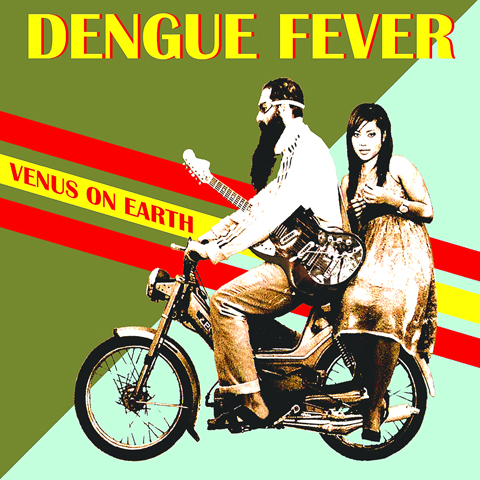Urban Nomad Film Fest (城市游牧影展), Taiwan’s only truly independent underground film festival, kicks into full gear tonight with screenings of Pervert’s Guide to Cinema, Part 1, a dozen shorts, and a film by a director who rode the rails across the US for 16 years, armed with a Super-8 camera and documenting the universe of hobo graffiti.
Now in its seventh year, the festival screens experimental and animation works, features, short films and documentaries by foreign and local filmmakers.
As always, it’s a refreshing change of pace from the earnestness of Taipei’s other film festivals. But in recent years the quality of its program has improved dramatically. What was once primarily a showcase of mostly local, extravagantly lo-fi productions, is now attracting international attention.

PHOTOS COURTESY OF KEVIN ESTRADA
Over the past, Urban Nomad has toured outside Taiwan for the first time. Last year’s program was shown in its entirety this past March in Hong Kong. Organizers were also invited by the Scope art fair to show Urban Nomad films and video art at exhibitions in Miami and Basel, Switzerland.
“The cool thing is that it gave us the chance to show Taiwanese film and art outside Taiwan, which is not happening that much,” said festival cofounder David Frazier. (Frazier was formerly a reporter at the Taipei Times.)
Urban Nomad is now nearly 100 percent bilingual: Chinese-language films have English subtitles and vice-versa. Frazier believes this is one of the main reasons why it’s been attracting more and better films. This year there were more than 250 submissions— 70 were accepted — compared with 140 submissions last year. As late as two years ago, Urban Nomad’s entire program consisted of fewer than 50 films.

Photos courtesy of kevin estrada
A glance at the schedule shows plenty of promise. There’s a special China Human Rights program on Monday. The Corporation, which traces the origins and the evolution of the corporation, screens on Tuesday. Wednesday features a Star Trek parody billed as “what may be the most-watched film in the history of Finnish cinema.” And on Thursday there’s Sleepwalking Through the Mekong, a rock ’n’ roll documentary about Californian band Dengue Fever with a Cambodian-American singer who tour Cambodia with a repertoire of 1960s and 1970s Khmer oldies.
Among the shorts worth checking out: Hiya, a hilarious piece starring members of local punk band Children Sucker (表兒) filmed by Lai Wen-hsuan (賴文軒) that shows tonight at 8:30pm; Who Kills Rockstars?, tomorrow at 7:30pm; and Waterfront Villa Bonita, a film about cults and bank robbers by Ian Lou (樓一安), editor of the recently released, critically acclaimed movie God Man Dog (流浪神狗人). Waterfront will be shown on May 2, at 7:30pm.

That US assistance was a model for Taiwan’s spectacular development success was early recognized by policymakers and analysts. In a report to the US Congress for the fiscal year 1962, former President John F. Kennedy noted Taiwan’s “rapid economic growth,” was “producing a substantial net gain in living.” Kennedy had a stake in Taiwan’s achievements and the US’ official development assistance (ODA) in general: In September 1961, his entreaty to make the 1960s a “decade of development,” and an accompanying proposal for dedicated legislation to this end, had been formalized by congressional passage of the Foreign Assistance Act. Two

March 31 to April 6 On May 13, 1950, National Taiwan University Hospital otolaryngologist Su You-peng (蘇友鵬) was summoned to the director’s office. He thought someone had complained about him practicing the violin at night, but when he entered the room, he knew something was terribly wrong. He saw several burly men who appeared to be government secret agents, and three other resident doctors: internist Hsu Chiang (許強), dermatologist Hu Pao-chen (胡寶珍) and ophthalmologist Hu Hsin-lin (胡鑫麟). They were handcuffed, herded onto two jeeps and taken to the Secrecy Bureau (保密局) for questioning. Su was still in his doctor’s robes at

Last week the Democratic Progressive Party (DPP) said that the budget cuts voted for by the China-aligned parties in the legislature, are intended to force the DPP to hike electricity rates. The public would then blame it for the rate hike. It’s fairly clear that the first part of that is correct. Slashing the budget of state-run Taiwan Power Co (Taipower, 台電) is a move intended to cause discontent with the DPP when electricity rates go up. Taipower’s debt, NT$422.9 billion (US$12.78 billion), is one of the numerous permanent crises created by the nation’s construction-industrial state and the developmentalist mentality it

Experts say that the devastating earthquake in Myanmar on Friday was likely the strongest to hit the country in decades, with disaster modeling suggesting thousands could be dead. Automatic assessments from the US Geological Survey (USGS) said the shallow 7.7-magnitude quake northwest of the central Myanmar city of Sagaing triggered a red alert for shaking-related fatalities and economic losses. “High casualties and extensive damage are probable and the disaster is likely widespread,” it said, locating the epicentre near the central Myanmar city of Mandalay, home to more than a million people. Myanmar’s ruling junta said on Saturday morning that the number killed had